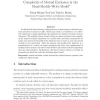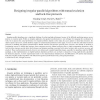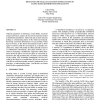25 search results - page 2 / 5 » Fast and Fair Mutual Exclusion for Shared Memory Systems |
JPDC
2006
2006
A tight bound on remote reference time complexity of mutual exclusion in the read-modify-write model
13 years 5 months ago
In distributed shared memory multiprocessors, remote memory references generate processor-to-memory traffic, which may result in a bottleneck. It is therefore important to design ...
PODC
1990
ACM
13 years 9 months ago
1990
ACM
Three self-stabilizing protocols for distributed systems in the shared memory model are presented. The first protocol is a mutual exclusion protocol for tree structured systems. T...
PODC
2010
ACM
13 years 5 months ago
2010
ACM
Mutual exclusion is used to coordinate access to shared resources by concurrent processes. k-Exclusion is a variant of mutual exclusion in which up to k processes can simultaneous...
JPDC
2006
13 years 5 months ago
2006
Irregular parallel algorithms pose a significant challenge for achieving high performance because of the difficulty predicting memory access patterns or execution paths. Within an...
WSC
2004
13 years 6 months ago
2004
With the properties of autonomy, social ability, reactivity and pro-activeness, agents can be used to represent entities in distributed simulations, where fast and accurate decisi...



